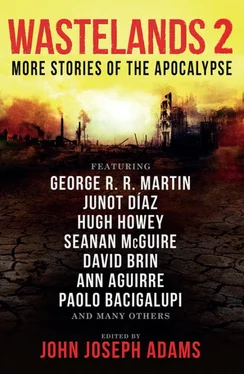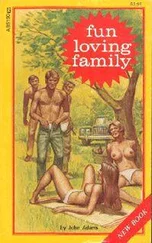Part Three—The Reign of Insects
Though the butterfly men’s cunning won the war, their flighty emotions and brief life spans made them unsuitable for leading a world, and so it was that the cockroach men became the rulers of the earth. Tough enough to survive dismemberment because their brain processes were spread throughout their becarapaced bodies, and possessed of the keen and supernatural senses of scavengers who had once lived among creatures many hundreds of times their own size, the cockroaches had the desire and capacity to enact a reign of fascism on the other insect men the like of which had never been seen before.
Ant men and bee men filled the roles of farmers and drudges. Atlas and rhinoceros beetle men provided brute force. Flea and mite men accomplished those tasks requiring agility.
Mosquito men served as the secret police. The cockroach men sent them to swarm on enemies of the state and drain them dry—and there was never a lack of traitors to keep them fed.
Alas, the plight of the butterfly men was only to become worse, for the cockroach men were loathe to risk the same end which had befallen their enemies. To ensure their safety from the butterfly’s dangerous knowledge, they imprisoned the butterfly men in a dark chain of underground caves where they lived their brief, miserable lives out of the sun’s reach. Within a season and twelve generations, all conscious knowledge of how to create viruses from blood was gone, but the butterfly men’s unhappy descendents remain incarcerated in their underground cells today.
Above ground, bees and ants marched to the cockroach’s well-timed rhythm, carrying crops from outlying farms into the hills of the city. Caravans of traveling gypsy moth men departed each hour on the hour, and the cockroach men began great civil works projects to erect bridges and statues and roads and memorials and temples. Larvae were taken away from their hatchers and forced to work at backbreaking labor past adulthood; dragonfly men journalists reported only that news which drifted on the prevailing winds of fascism; hives were routinely broken up to redistribute the working population. While the other insect men lived poor and wintry lives subsisting on meager grain, the cockroach men gorged on honey, orange peels and moldy bread. Those who dissented disappeared, only to be found as blood-drained corpses swinging from sturdy branches.
Yet all this might have endured, were it not for the deadliest sin of the cockroach men. Ancestrally predisposed to look favorably upon debris, the cockroach men allowed their wastes to build up in giant landfills. Junkyards choked out the fields; garbage seeped into the ground water; rotting trash provided breeding grounds for the nastiest, most virulent epidemics and hemorrhagic fevers. When the first wave of ant men died of a plague that turned their exoskeletons scarlet, at first the cockroach men suspected their old accomplices the butterfly men, but when they went to interrogate them, no one could remember where that unhappy species had been stashed.
The trees cried out against what was happening to them. New bacteria chewed through leaves and blocked out photosynthesis; roots withered in poisoned soil. Things would only get worse, they knew—oh, how they would suffer. Across the globe it would be the same for all things natural: seas would rumble, ecosystems would shatter; even the iron-breathing Archeans in the deepest volcanic vents would perish if the cockroach men were allowed to continue on their path. This will hurt you too, earth , the trees wailed, not in the language of wind-in-leaves which they had used to communicate with the humans, but in the language of roots-in-ground and life-in-soil.
And the earth heard their plight. It shivered, cracking the super-continent down the middle like a slice of lightning splitting the sky. I have seen enough of mankind’s ability to make trouble , it rumbled to itself in the language of magma-under-crust, and it initiated the seventh apocalypse, the Apocalypse of Darkness.
The Apocalypse of Darkness was the most terrible yet suffered by mankind. Untold agony wiped out almost the entire population of the globe.
Three cricket men survived. They woke quaking into the dawn, antennae shivering down their backs. They were two females and a male, and they might have carried their line into future generations, but the three of them regarded each other with dark, compound eyes that reflected the same understanding.
“We must never bear children,” said the oldest and wisest. “Or someday we might tell them what we have experienced, and we must never damn another soul to see what we have seen, even by picturing it in their minds.”
The others agreed, and the three of them leapt off the tallest cliff they could find, dying in silence. Though the details of the Apocalypse of Darkness are known, it would be disrespectful to the cricket men’s sacrifice to record them.
Interlude—Whisperings from Branch to Branch
So, little rootlings, little seedlings, little starting-to-grows, that is why the earth is quiet now. Feel the snails trail across your bark. Listen to the birds trilling in your branches and the insects nibbling your leaves. Hear the snap of monkeys brachiating from branch to branch. With mankind gone, we are free to enjoy these things. Are they not good?
Ah, but by now you’ve guessed, the time of man is not entirely behind us. Why else would we whisper this tale on a fine spring morning, with winter’s frosts sweetly melted?
Before the Apocalypse of Darkness, we did not tell each other stories. Through necessity, we have learned the skill. Next year, you will help us tell the starting-to-grows about The Great Cathedral Mother who stood in the center of the world until her children sprouted up in a ring around her and sucked up all the sunlight. Her trunk remains where she once grew, swollen with dead leaves and congealing sap and blind grubs. Someday, lightning will strike all the way through the earth, piercing her in two, and each half will grow into a tall, straight pine with a tip like a spear: one going up, one going down. And when this happens, everything we think we know about the world will change.
The year after that, we will tell the great love story of The Garlanded Tree and the hive of bees who fertilized her.
But this is our most important tale. Like winter, man will return in his season. By the time he does, little rootling, you may have a great solid trunk like your mother. Or perhaps you will have grown and perished, and it will be your children standing. Or your children’s children. Whoever grows when mankind returns must remember how to drop their leaves and huddle naked in the snow.
And also, when man comes back, we wish to return to him his history so that he may hold and regard it like a spring bloom budding on a new-leafed branch, new and yet also old, a gift not unlike the one given last spring. Who knows? Maybe this will be the time mankind can learn from stories.
Part Four—Hands Yearning Upward Through the Surface of the Earth
Stretch your roots into the ground, little seedlings. Listen. Can you hear life rustling under the soil?
Who else, but the butterfly men? The Apocalypse of Darkness did not faze them. Having become accustomed to their miserable state, they could no longer be depressed by the black. They crept anxiously through their underground dwellings, their bright wings beautiful and unseen, and whispered to each other, “Do you feel that? What’s happening?”
When the Apocalypse was over, without knowing the reason for it, the butterfly men wept together for twenty-four full hours in cosmic mourning for the human race of which they were now the sole representatives. But since their quixotic moods were often given to fits of communal sorrow, they failed to understand the uniqueness of the occasion.
Читать дальше












